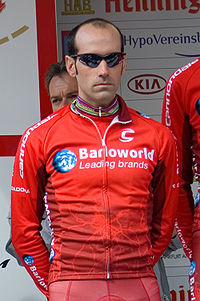Igor Astarloa

Igor Astarloa Askasibar (born March 29, 1976 in Ermua , Spain ) is a former Spanish cyclist .
Career
Astarloas turned pro in 2000 with the Mercatone Uno-Albacom cycling team . His first significant success was winning the Spanish one-day race Clásica Primavera . Astarloa's most successful year was 2003. First he won the classic (cycling) Flèche Wallonne in spring by attacking the finish slope. In the fall he won the road world championship in Hamilton , Canada , after he was able to break away from a six-man leading group on the last climb and saved his lead to the finish.
In May 2008, Astarloa's then team Milram separated from him. The reason were abnormal blood values that suggested doping suspicion. However, the team leader of the Milram team emphasized that there was no proven doping . On June 17th, 2009 the UCI announced that doping proceedings had been initiated against Igor Astarloa and four other drivers due to abnormalities in their biological passport . Astarloa then ended his career after the 2009 season. At the end of his career, he was banned for 2 years by the disciplinary committee of the Spanish Cycling Federation in 2010 and was fined € 35,000.
successes
- 2001
2002
- Overall ranking and one stage of the Brixia Tour
2003
- 2004
- one stage Brixia Tour
2005
- one stage tour of Burgos
2006
Teams
- 1999 Riso Scotti-Vinavil ( Stagiaire )
- 2000 Mercatone Uno-Albacom
- 2001 Mercatone Uno-Stream TV
- 2002 Saeco-Longoni Sport
- 2003 Saeco
- 2004 Cofidis-Le Crédit par Téléphone (until April 24th)
- 2004 Lampre (from April 25th)
- 2005 Barloworld-Valsir
- 2006 Barloworld
- 2007 Team Milram
- 2008 Team Milram (until May 29th)
- 2009 Amica chips knob
Web links
- Igor Astarloa in the Radsportseiten.net database
- Igor Astarloa in the Sports-Reference database (English; archived from the original )
Individual evidence
- ↑ radsport-news.com of April 23, 2003: Spaniard Astarloa wins Flèche Wallonne
- ↑ radsport-news.com of October 12, 2003: Astarloa surprise world champion - Zabel eleventh
- ↑ rad-net.de of May 29, 2008: Milram separates from Astarloa
- ↑ UCI: radsport-news.com of June 17th, 2009: "A very important step in the fight against doping"
- ↑ cyclingnews.com of January 16, 2010: Astarloa retires with good and bad memories
- ↑ cyclingnews.com of December 1, 2010: Astarloa suspended and fined for UCI biological passport infraction
| personal data | |
|---|---|
| SURNAME | Astarloa, Igor |
| ALTERNATIVE NAMES | Askasibar, Igor Astarloa (full name) |
| BRIEF DESCRIPTION | Spanish cyclist |
| DATE OF BIRTH | March 29, 1976 |
| PLACE OF BIRTH | Ermua , Spain |